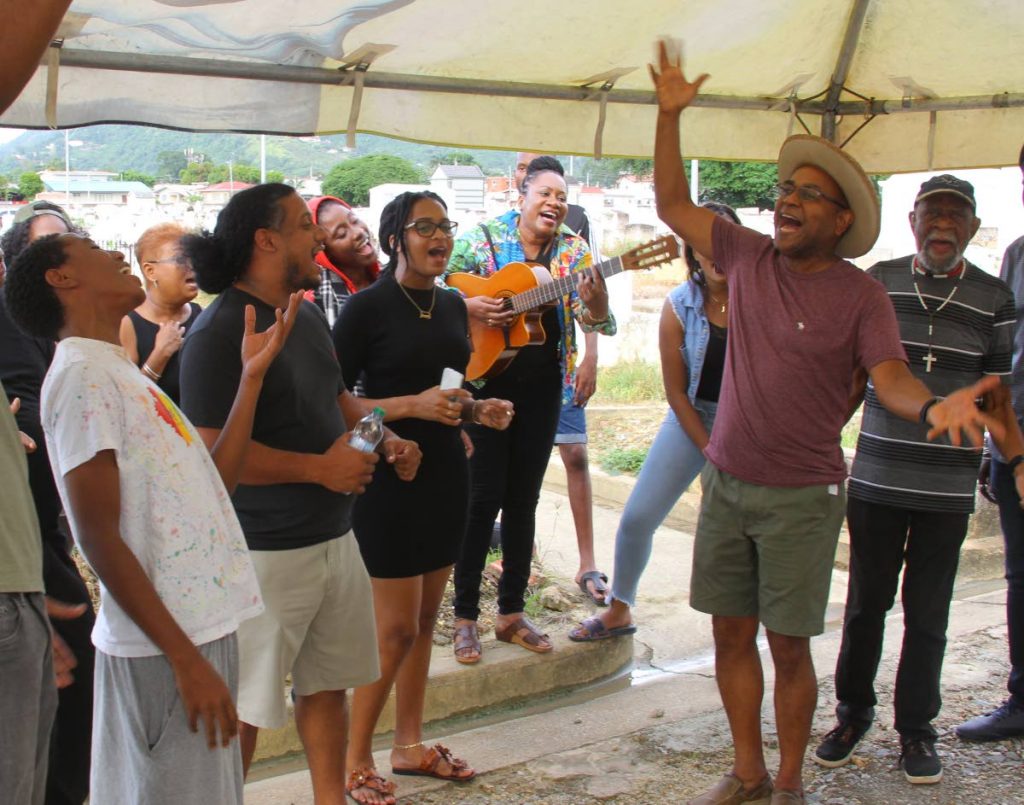Ah wanna fall makes you fall for kaiso

Poet and writer ANDRE BAGOO reviews Ah Wanna Fall, a play on the Mighty Spoiler, performed at Newtown Playboys Pan Theatre in Port of Spain.
KAISO and theatre go hand in hand. What is a calypso if not a dramatic monologue? Or a dramatic presentation in song? In the 1930s, a special genre of theatre called the “calypso drama” rose to prominence. These musical playlets became popular, came to be regarded as containing the seeds, potentially, of a national theatre. Such a theatre may still be an elusive dream, but the immersive experience of Ah Wanna Fall brings us closer.
Rawle Gibbons’ play about the Mighty Spoiler draws attention to the blurred lines between calypso and theatre; performance and real life; history and lived experience.
Director Eugene Williams’ production, billed as a musical, is staged in a panyard. We enter a well-known space expecting to see pan players rehearsing musical arrangements. We come close, getting a live band that churns out 46 calypso classics by figures such as Lord Kitchener, Spoiler, Wonder, Panther, Dictator, Killer, Pharaoh, Lord Blakie, Lord Invader, Commander, Pretender, and Duke of Iron.
Playwright Gibbons threads a narrative around the songs, but the star is the music. From the very beginning, it’s clear the calypsoes of yesteryear maintain their relevance. Little has changed since the post-World War II era. So in Professor Kitchener we hear:
I am tired reading cases about murderers
Every day, every day upon the newspapers
Is either Sam kill Johnny or Johnny kill Joe
Is like a murder competition everywhere you go
Overall, this production works as a kind of revue of vintage kaiso. Because the audience is expected to sing the refrains, the calypsoes take on special dramatic force. The fourth wall is removed.
But there are meta-elements too. The play’s story is set at a bar. And in this production at the Newtown Playboys Pan Theatre (it was previously staged at Queen’s Hall in 1992), the actual bar is turned into the bar in the story. During the intermission we buy drinks where the characters are served. We’re in their world.
Newtown, Port of Spain, works well as a location for this production, perhaps because the area has architectural features reminiscent of the post-war period, perhaps because of its role in the story of pan. Perhaps because it’s not far from the Mighty Spoiler’s unmarked grave. (Last Friday, the cast placed a tombstone in Spoiler's – Theophilus Phillip– memory at the Woodbrook Cemetery.)
“Newtown presents a conjunction of histories,” Gibbons says in a note to the production. “Our performance of memory is in defiance of a culture of what may be called conscious amnesia…With this production we launch a campaign for the reclamation, not so much of Spoiler, but ourselves.”
Director Williams calls the production “an invocation of cultural memory."
“My greatest fascination with the play, though, was the fact that pivotal to its performative universe is The Mighty Spoiler – the enigmatic fantasist,” Williams says. Spoiler, described by Kitchener as “the best”; whose eternal chorus was “I wanna fall”; and in whose name Derek Walcott penned The Spoiler’s Return, a curse poem to Trinidad in which Spoiler comes back to life and wryly declares: “I decompose, but composing still” and “Hell is a city much like Port of Spain.”
On that note, a few problems. Some sections of the latest production dealing with race and gender are tone deaf. The narrative thread is eventually eaten whole by the songs – fitting for those who just want to sing, disappointing for those invested in the story. The second half feels simultaneously rushed and too long. That’s a hard thing to achieve. And there were distracting audio problems on the night I attended.
But the cast is excellent and the production well-rehearsed. The most compelling performances are by scene-stealing minor characters such as those brought to life by a turbo-charged Tishanna Williams (Imelda) and a hilarious David Bereaux (Sales). Overall, Ah Wanna Fall will make you fall for calypso all over again.
The final show is today at 6 pm.


Comments
"Ah wanna fall makes you fall for kaiso"